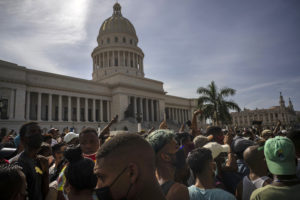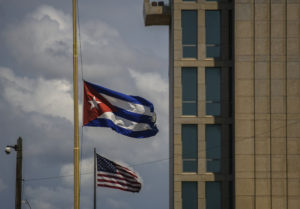While the first Summit of the Americas to feature the participation of Cuban authorities gets underway in Panama, news reports indicate that the United States Department of State has sent a recommendation to the White House endorsing the removal of Cuba from its list of state sponsors of terrorism. Earlier this week President Barack Obama pledged to act quickly as soon as he received the recommendation.
This is welcome news, and is both a necessary step towards opening a U.S. embassy in Havana as well as part of President Obama’s deeper process of updating U.S. policy towards Cuba for the 21st century. Cuba was originally placed on the list in 1982 on the grounds that it supported armed revolution in the Americas during the Cold War, a justification that simply no longer holds true.
A telling indicator of this policy’s inapplicability is the fact that the brief section on Cuba in the last State Department report on the issue contains less than 200 words. Meanwhile, at least three times as many are devoted to each of the other countries on the list. Even the very language that the State Department has used in the past to describe Cuba made it abundantly clear that the U.S. could not possibly believe that Cuba remained a state sponsor of terrorism. The report points out “there was no indication that the Cuban government provided weapons or paramilitary training to terrorist groups.”
Far from a source of regional or global instability, in recent years Cuba has facilitated key dialogue between government officials and the two armed groups it is accused of having supported in the past: the Basque Fatherland and Liberty (ETA) and the Revolutionary Armed Forces of Colombia (FARC). The Spanish government has expressed gratitude towards Cuba for its cooperation on the issue, and the Havana-based Colombian peace process seems well-poised to end that country’s 50-year armed conflict.
The recommendation to remove Cuba from the list represents a long overdue update on Cuba policy, and will go a long way towards improving U.S. relations with all of Latin America. The outdated U.S. policy Cuba has historically been one of the biggest sticking points with the rest of the hemisphere, and the 2012 Summit saw Latin American presidents across the political spectrum challenging the policy.
This move, and the administration’s deeper engagement with Cuba in general, underscore the historic importance of this year’s Summit. When Presidents Barack Obama and Raul Castro meet face to face in the coming days, it will be about more than U.S.-Cuba relations. Ultimately, their handshake could symbolize the beginning of a new era in relations between the U.S. and the rest of the hemisphere.


